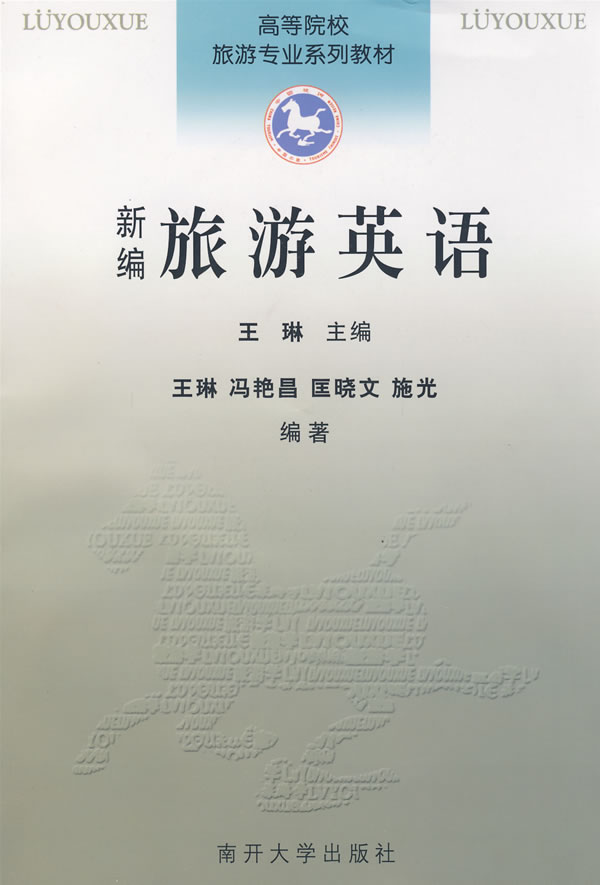
包邮新编旅游英语-(含光盘两张)

- ISBN:9787310029532
- 装帧:暂无
- 册数:暂无
- 重量:暂无
- 开本:16开
- 页数:250
- 出版时间:2008-06-01
- 条形码:9787310029532 ; 978-7-310-02953-2
内容简介
本书参考《大学英语教学大纲》对专业英语教授学时和阅读总量的要求,以语言教学中的功能意念教学法为指导思想,结合旅游六大要素“吃、住、行、游、购、娱”,将内容分为相应的六个模块。整篇内容以模块为纲,以旅游活动为线,创设情景对话,精选相关文章。对话强调功能性、真实性和实用性,文章则突出知识性、趣味性和可读性。书末还根据行业从业人员的实际需求,以附录的形式介绍了“导游过程中的突发事件及其应急方法”,力求向学生提供其未来工作岗位所需要的专业英语知识和技能,培养专业英语交际能力,体现出专业英语学习和教学特征。
本书由六大模块、二十个单元组成,每单元包括“听与说”,“阅读与翻译”和“模拟写作”三部分。**部分为“听与说”,其目的是培养学生以英语进行专业内容口语交际以及跨文化交际的能力;第二部分为“阅读与翻译”,其目的是培养学生阅读和专业英语翻译的能力;第三部分为“模拟写作”,其目的是培养学生参照范例用英语拟写和翻译商业信函、摘要、广告或图表说明等应用文的能力。
目录
unit 1
part ⅰ listening and speaking
part ⅱ basic reading: marco polo and his travels
part ⅲ simulated writing: speech of welcome
unit 2
part ⅰ listening and speaking
part ⅱ basic reading: guiding principles of intercultural communication
part ⅲ simulated writing: letter of inquiry
unit 3
part ⅰ listening and speaking
part ⅱ basic reading: transportation in china
part ⅲ simulated writing: advertisement
unit 4
part ⅰ listening and speaking
part ⅱ basic reading: magnificent china tour
part ⅲ simulated writing: a letter of thanks
module 2 accomondation
unit 5
part ⅰ listening and speaking
part ⅱ basic reading: the hotel of future
part ⅲ simulated writing: registration forms
unit 6
part ⅰ listening and speaking
part ⅱ basic reading: caneer paths and opportunities in the hotel or lodging business/49
part ⅲ simulated writing: agenda of meeting
module 3 catering
unit 7
part ⅰ listening and speaking
part ⅱ basic reading: eight cuisines in china
part ⅲ simulated writing: menu
unit 8
part ⅰ listening and speaking
part ⅱ basic reading: food tourism is on the boll
part ⅲ simulated writing: reply to letter of complaint
unit 9
part ⅰ listening and speaking
part ⅱ basic reading: about tea
part ⅲ simulated writing: letter of invitation
module 4 sightseeing
unit 10
part ⅰ listening and speaking
part ⅱ basic reading: travel agency
part ⅲ simulated writing: scheduled itinerary
unit 11
part ⅰ listening and speaking
part ⅱ basic reading: world heritage site
part ⅲ simulated writing: notice
unit 12
part ⅰ listening and speaking
part ⅱ basic reading: heritage gardens in suzhou
part ⅲ simulated writing: letter of job application
unit 13
part ⅰ listening and speaking
part ⅱ basic reading: the great wall revisited
part ⅲ simulated writing: e-mail
unit 14
part ⅰ listening and speaking
part ⅱ basic reading: travel agency management/128
part ⅲ simulated writing: letter of recommendation /135
module shopping
unit 15
part ⅰ listening and speaking
part ⅱ basic reading: shopping malls
part ⅲ simulated writing: order form
unit 16
part ⅰ listening and speaking
part ⅱ basic reading: chinese embroidery/148
part ⅲ simulated writing: claim letter
module 6 entertainment
unit 17
part ⅰ listening and speaking
part ⅱ basic reading: walt disney world resort
part ⅲ simulated writing: memorandum
unit 18
part ⅰ listening and speaking
part ⅱ basic reading: beijing opera
part ⅲ simulated writing: writings based on tables and graphs
unit 19
part ⅰ listening and speaking
part ⅱ basic reading: the development and features of chinese philosophy
part ⅲ simulated writing: a message or note/183
unit 20
part ⅰ listening and speaking
part ⅱ basic reading: sustainable tourism
part ⅲ simulated writing: resume
appendix
frequently asked questions on emergencies & their contingency measures
key to the exercises
references
节选
《新编旅游英语》参考《大学英语教学大纲》对专业英语教授学时和阅读总量的要求,以语言教学中的功能意念教学法为指导思想,结合旅游六大要素“吃、住、行、游、购、娱”,将内容分为相应的六个模块。整篇内容以模块为纲,以旅游活动为线,创设情景对话,精选相关文章。对话强调功能性、真实性和实用性,文章则突出知识性、趣味性和可读性。书末还根据行业从业人员的实际需求,以附录的形式介绍了“导游过程中的突发事件及其应急方法”,力求向学生提供其未来工作岗位所需要的专业英语知识和技能,培养专业英语交际能力,体现出专业英语学习和教学特征。
《新编旅游英语》由六大模块、二十个单元组成,每单元包括“听与说”,“阅读与翻译”和“模拟写作”三部分。**部分为“听与说”,其目的是培养学生以英语进行专业内容口语交际以及跨文化交际的能力;第二部分为“阅读与翻译”,其目的是培养学生阅读和专业英语翻译的能力;第三部分为“模拟写作”,其目的是培养学生参照范例用英语拟写和翻译商业信函、摘要、广告或图表说明等应用文的能力。
相关资料
Such assumptions stem from potentially devastating ignorance and can lead to much frustration for members of both cultures Entering a culture with this type of ethnocentrism, the assumption your own culture is correct, is another byproduct of ignorance and cultural misunderstanding. Main types of misunderstanding are Language
Even when two people think they can speak each other's language, the chance of error is high Usages and contextual inferences may be completely different between cultures. So even though one speaker may have learned the vocabulary of the other's language, selecting the most appropriate words, with the correct intonation, spoken with appropriate eye contact while standing a proper distance from the other are all critical even before one considers the propriety of the topic to be discussed. Rights, values, and needs
Some cultural characteristics will be easy to identify, e.g. whether people are conscious of status or make displays of material wealth. But many rights are assumed, values are implied, an d needs are unspoken, (e.g. for safety, security, love, a sense of belonging to a group, self-esteem, and the ability to attain one's goals).
For example, issues of personal security, dignity, and control will be very different as between an a bled and a disabled person. Similarly, there may be problems of respect when a person from a rigidly class-based culture meets a meritocrat2, or where there is racism, sexism or religious intolerance in play. In such situations, identity is fundamental when disputing the proper role or "place" of the other, about who is in control of their lives, and how they present themselves to the outside world. But the reality is more deeply rooted in power relationships: about who is on top of the social, economic, and/or political hierarchy. Family members or long term rivals may be obsessed with their mutual competition. The relationships between racial or ethnic groups may be affected by economi
-

THE LITTLE PRINCE-小王子
¥6.3¥19.8 -

了不起的盖茨比(纯英文)/床头灯英语.3000词读物
¥5.1¥12.8 -

茶花女
¥5.2¥12.0 -

安徒生童话精选
¥13.6¥40.0 -

MADAME BOVARY-包法利夫人
¥10.9¥36.8 -

考研英语背单词20个词根词缀
¥2.2¥3.2 -

地心游记(纯英文)/床头灯英语.3000词读物
¥6.4¥15.8 -

小妇人(纯英文)/床头灯英语.3000词读物
¥5.7¥15.8 -

视听说教程2学生用书
¥16.3¥45.0 -

命案目睹记
¥13.2¥33.8 -

夏洛的网(平装双语版)//2023新定价
¥37.0¥58.0 -

鲁滨孙漂流记
¥21.6¥48.0 -

简明英语写作手册
¥12.9¥39.8 -

企鹅口袋书系列·伟大的思想20:论自然选择(英汉双语)
¥6.3¥14.0 -

英文滑稽诗300首:英汉对照
¥11.3¥42.0 -

沉思录
¥14.0¥21.0 -

巴黎圣母院
¥5.0¥15.5 -

简爱
¥11.3¥12.9 -

理想丈夫
¥11.1¥28.0 -

恋爱中的女人-中译经典文库-世界文学名著-第五辑
¥9.3¥29.0










